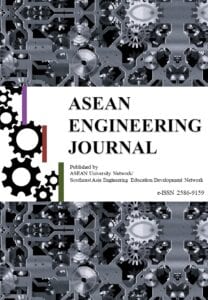EFFECTS OF MIX PROPORTION ON ELECTRICAL RESISTIVITY OF CONCRETE WITH FLY ASH
DOI:
https://doi.org/10.11113/aej.v7.15492Abstract
The aim of this paper is to investigate the effects of mix proportion on electrical resistivity of concrete with fly ash. The electrical resistivity of concrete is measured by using four Wenner probes. The varied parameters in this study were water/binder ratio, fly ash content, and paste content. Electrical resistivity of water-saturated concrete at several different ages was studied and compared with compressive strength and rapid chloride penetration. Based on experimental results, a good relationship was obtained between results of compressive strength and rapid chloride penetration with electrical resistivity of concrete. The results of this study can be applied further to predict electrical resistivity of concrete when mix proportions are provided. According to the results, lower water/binder ratio concrete had higher resistivity than those with higher water/binder ratios. When cement was replaced at 40% by fly ash, electrical resistivity increased four times when compared to that of OPC concrete.
















